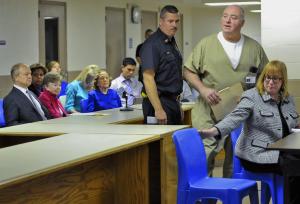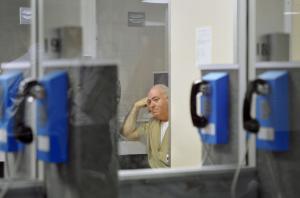Kennedy cousin Skakel wins new trial in 1975 death - Yahoo News
JohnButts@JBMedia - Reports:
Kennedy cousin Michael Skakel was granted a new trial on Wednesday by a Connecticut judge who ruled his attorney failed to adequately represent him when he was convicted in 2002 of killing his neighbor in 1975.
The ruling by Judge Thomas Bishop marked a dramatic reversal after years of unsuccessful appeals by Skakel, the 52-year-old nephew of Robert F. Kennedy's widow, Ethel Kennedy. Skakel is serving 20 years to life.
Bridgeport State's Attorney John Smriga said prosecutors will appeal the decision.
Skakel's current attorney, Hubert Santos, said he expects to file a motion for bail on Thursday. If a judge approves it, Skakel could then post bond and be released from prison.
"We're very, very thrilled," Santos said. "I always felt that Michael was innocent."
Skakel argued his trial attorney, Michael Sherman, was negligent in defending him when he was convicted in the golf club bludgeoning of Martha Moxley when they were 15 in wealthy Greenwich. Santos called the case weak.
Prosecutors contended Sherman's efforts far exceeded standards and that the verdict was based on compelling evidence against Skakel.
John Moxley, the victim's brother, said the ruling took him and his family by surprise and they hope the state wins an appeal.
"Having been in the courtroom during the trial, there were a lot of things that Mickey Sherman did very cleverly," Moxley said about Skakel's trial lawyer. "But the evidence was against him. And when the evidence is against you, there's almost nothing you can do.
"I don't care if it was Perry Mason," Moxley said. "The state had the evidence. It was his own words and deeds that led to the conviction."
In his ruling, the judge wrote that defense in such a case requires attention to detail, an energetic investigation and a coherent plan of defense.
"Trial counsel's failures in each of these areas of representation were significant and, ultimately, fatal to a constitutionally adequate defense," Thomas wrote. "As a consequence of trial counsel's failures as stated, the state procured a judgment of conviction that lacks reliability."
During a state trial in April on the appeal, Skakel took the stand and blasted Sherman's handling of the case, portraying him as an overly confident lawyer having fun and basking in the limelight while making fundamental mistakes from poor jury picks to failing to track down key witnesses.
Santos argued that the prosecutors' case rested entirely on two witnesses of dubious credibility who came forward with stories of confessions after 20 years and the announcement of a reward. Skakel had an alibi, he said.
Santos contends Sherman was "too enamored with the media attention to focus on the defense." Sherman told criminal defense attorneys at a seminar in Las Vegas six months before the trial that one of his goals in representing Skakel was to have a "good time," Santos said.
"Defending a murder charge is not about enjoying oneself, it is about zealously advocating for the client and providing him with the assistance guaranteed by our constitution," Santos wrote in court papers. "It is not about getting invited to A-list parties in New York City, or launch parties for the trendy new television show, or going to the Academy Awards and all the 'cool parties' afterwards."
Sherman has said he did all he could to prevent Skakel's conviction and denied he was distracted by media attention in the high-profile case.
Santos contends Sherman failed to obtain or present evidence against earlier suspects, failed to sufficiently challenge the state's star witness and other testimony and made risky jury picks including a police officer.
Prosecutors countered that Sherman spent thousands of hours preparing the defense, challenged the state on large and small legal issues, consulted experts and was assisted by some of the state's top lawyers. Sherman attacked the state's evidence, presented an alibi and pointed the finger at an earlier suspect, prosecutors said.
"This strategy failed not because of any fault of Sherman's, but because of the strength of the state's case," prosecutor Susann Gill wrote in court papers.
The state's case included three confessions and nearly a dozen incriminating statements by Skakel over the years, Gill said. She also said there was strong evidence of motive.
"His drug-addled mental state, coupled with the infuriating knowledge that his hated brother Tommy had a sexual liaison with Martha, and the fact that Martha spurned his advances, triggered the rage which led him to beat her to death with a golf club," Gill wrote.
Gill said what Sherman did with his personal time was irrelevant. She said the evidence cited by the defense was not significant and that Sherman had sound strategic reasons for his decisions.
Skakel, who maintains his innocence, was denied parole last year and was told he would not be eligible again to be considered for release for five years.

